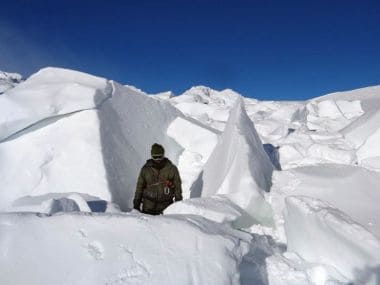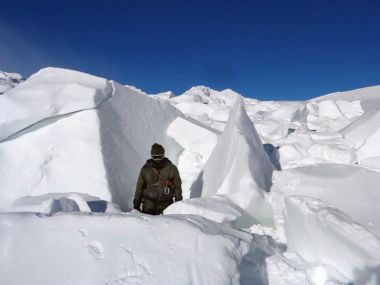The horrifying death of ten soldiers in an avalanche on the Siachen glacier has sharpened focus on the Herculean task of holding the place. The miraculous survival of Lance Naik Hanumanthappa for six days under 25 feet of snow is a vivid metaphor for how nearly impossible a task the Army’s men and officers have accomplished day after day for more than 30 years now. The heroism of the 150 soldiers who continued to search for six days in impossible midwinter conditions at a post equipped for ten soldiers is a further testament to the incredible gritty and determination that has allowed India to hold the place. Some of those soldiers will endure terrible consequences to their health. It is the stuff of epic legends. It is easy to lose sight of the fact that, although the media spotlight will soon be turned off, such indescribable courage will continue every day and every night, as it has ever since the Army established a hold on the heights above the glacier in the summer of 1984. An epic race between the Indian and Pakistani armies to establish control over the glacier area continued from 1984 till 1990. Since then, the entire ridge has remained under Indian control, though Pakistan has posts at lower levels. The monetary cost has run into crores of rupees a day. The death toll is recorded at more than 800. Evacuations are frequent, every day. Injuries are constant and horrific - physical and psychological. [caption id=“attachment_2623044” align=“alignleft” width=“380”]  A file image of an Indian soldier in Siachen. AFP[/caption] Despite all this, morale remains high. There was a healthy debate until the 1990s over whether it was worth continuing to hold the glacier, but there is a general consensus now. It has become a Catch 22: each death adds to the burden of sacrifice, of respect for martyrdom, of the investment of lives. There is a sense that pulling back would amount to a betrayal of all those who have given their lives, or have put up with untold hardship over the 37 years since the first Indian Army expedition went to Siachen in 1979. Strategic calculations While it is natural to be swayed by emotion, especially amid the pathos of the recent deaths, it is also important to assess the strategic advantages. The Indian Army holds the ridge line to the west of the glacier. This ridge runs north towards the Shaksgam valley, the arc at the northern edge of Jammu and Kashmir state which Pakistan ceded to China in March 1963 - just weeks after Zulfikar Ali Bhutto became Pakistan’s foreign minister. That set the stage for a new Sino-Pak rapprochement, the brokering of Sino-US relations, and for China to gradually become Pakistan’s chief mentor. North of Shaksgam is the Karakoram highway, a passage from China to Pakistan’s Gwadar port on the Arabian Sea. It is such a vital part of China’s trade plans that China announced last year that it would invest $46 billion in that area of Jammu and Kashmir state and Pakistan. The ridges that run along the west and the east of the glacier form natural barriers against any Pakistani attempt to close in on the area which India controls between the eastern ridge of Siachen and the all-weather Karakoram Pass further east. Some military strategists further argue that controlling Siachen guarantees Indian control over the Nubra valley, a relatively green (and beautiful) part of Ladakh into which the Shyok river flows. (General Musharraf’s hare-brained Kargil misadventure in 1999, had apparently aimed to cut off India’s access to Nubra and Siachen, if not Ladakh altogether.) All these arguments favour holding on to the glacier. However, policymakers must move urgently on three fronts. One, all technical means to hold the area must be explored. Surely it is possible to minimize human deployment in an age of sensors, drones, satellites and other technical infrastructure. Two, the best equipment, back-up and data must be provided to those deployed. Organizations like the Snow and Avalanche Study Establishment (SASE) should be encouraged to provide real-time actionable inputs regarding unstable snow and ice formations such as cornices and crevasses. Negotiations Three, negotiations with Pakistan should get underway. Pakistan’s Ambassador Abdul Basit stated on Thursday that Pakistan was willing to talk about resolving the Siachen issue. His expression of sorrow for the tragic deaths on Siachen is appreciable. He described a resolution of the Siachen issue as `low hanging fruit’ which could be relatively easily obtained. That he said so to India’s main television news agency at Pakistan’s embassy in New Delhi indicates that the message was well thought out. In the past, India’s negotiators have aimed at an agreement to mark and mutually agree upon currently held ground positions. Given the high morale and resolve in the Army, and the outpouring of public sympathy and admiration, India could not give up this stated position at this point. One earnestly hopes enough headway could be made on this for both countries to move to the logical next step - to work towards at least partially demilitarizing the area. This would fit with the spirit of making borders irrelevant, of which both sides have spoken in recent years. Of course, that would demand enhanced trust between not only India and Pakistan, but also India and China. That is a tall order but, given the stirring sacrifices of the men on Siachen, it is an objective towards which all concerned should work with maximum determination and urgency.
The horrifying death of ten soldiers in an avalanche on the Siachen glacier has sharpened focus on the Herculean task of holding the place.
David Devadas is an expert on politics and geopolitics. Formerly a Senior Fellow at the Nehru Memorial Museum and Library, Visiting Professor at Jamia Millia Islamia, and Political Editor of Business Standard, he is currently Distinguished Fellow at the Institute for Social Sciences. He has written books on Kashmir, on youth, and on history. He has been a radio compere, guest faculty at JNU's Academic Staff College, St Stephen's College and Hindu College. He has worked for the Indian Express, The Hindustan Times, India Today, The Economic Times and Gulf News. His most impactful article, on a murder cover-up, prevented a Congress President from becoming prime minister. One led to the closure of an airline, and another created a furore and consequent clean-up in Delhi's health department. Several have correctly predicted election results in key states, and a series of reports from Srinagar made the government aware of how unsettled the situation there was in 1990. He is an alumnus of St Xavier's School, St Stephen's College, and the Indian Institute of Mass Communication. He has lived for extended periods in Geneva and Berlin, and has traveled to almost 50 countries. He enjoys various kinds of music, theatre, design, architecture and art. see more


)

)
)
)
)
)
)
)
)



